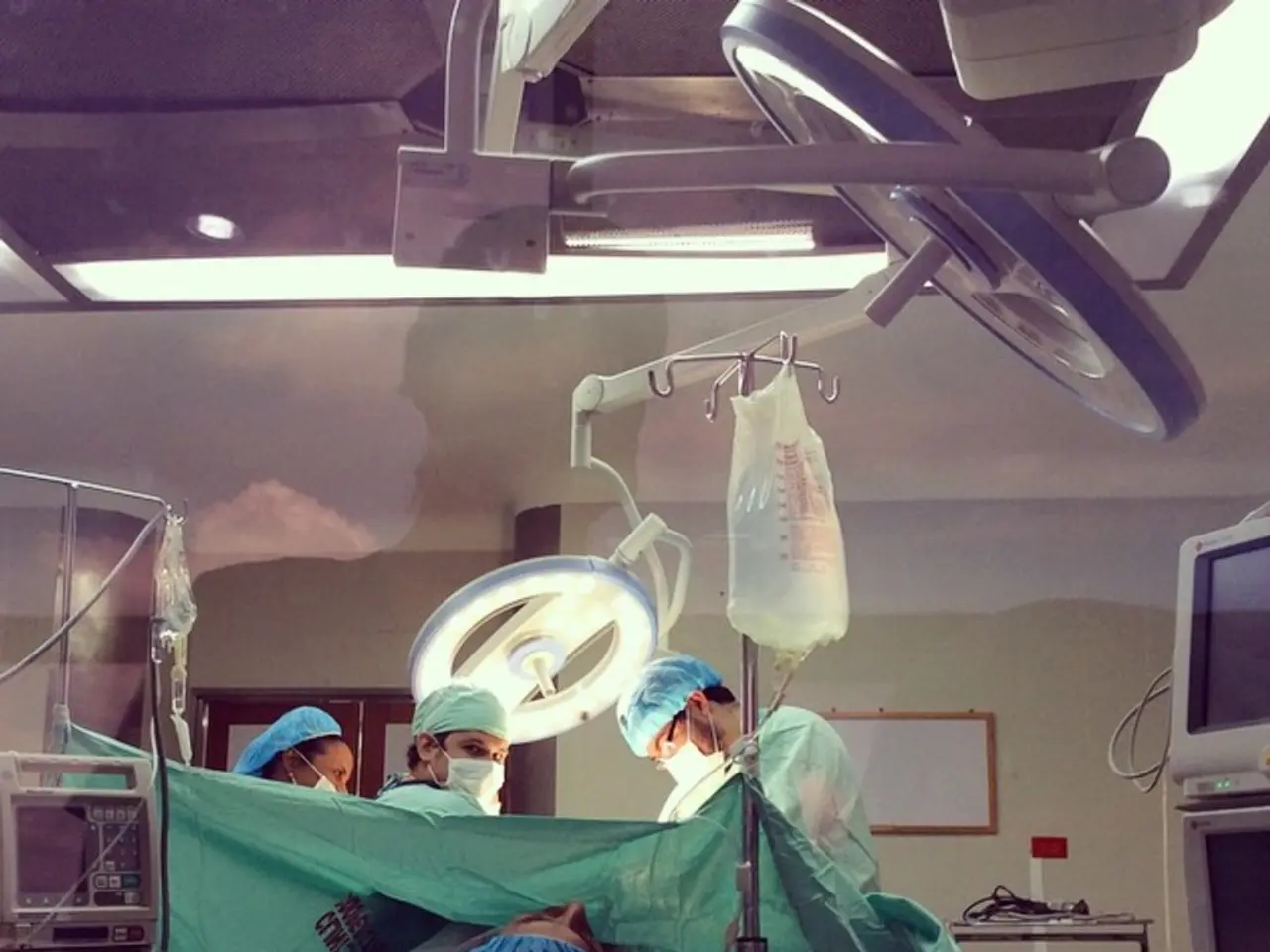Health official Robert F. Kennedy Jr. plans to discontinue $500 million worth of investments in vaccine research and development initiatives.
The Department of Health and Human Services (HHS) has announced a significant change in its vaccine development priorities, with the decision to halt funding for 22 mRNA vaccine projects, totaling $500 million [1][3]. This move comes amid concerns about the effectiveness of mRNA vaccines against upper respiratory infections like COVID-19 and the flu [1][2][4].
Robert F. Kennedy Jr., the current Secretary of HHS, has expressed doubts about the efficacy of mRNA vaccines, citing their failure to protect effectively against upper respiratory infections [1]. In response, Kennedy has stated that work is underway on an alternative, focusing on a "universal vaccine" that mimics "natural immunity" [3].
The HHS's decision reflects a shift towards technologies that meet current scientific standards and have stronger safety records [2][4]. The department is prioritizing vaccine platforms with transparent clinical and manufacturing data practices, as well as platforms such as whole-virus vaccines and novel technologies that remain effective even as viruses mutate [2][4].
Infectious disease experts have expressed concern about the decision to cancel the mRNA projects, as they credit the technology for slowing the 2020 coronavirus pandemic and believe it will be crucial in future pandemics [4]. Mike Osterholm, a University of Minnesota expert on infectious diseases and pandemic preparations, described the decision as "the most dangerous decision in public health in my 50 years in the business" [4].
The mRNA approach for vaccine development offers potential advantages of rapid production, which is crucial in the event of a new pandemic that requires a new vaccine [4]. However, the mRNA technology is currently used in approved COVID-19 and RSV shots, but has not yet been approved for a flu shot [4].
Moderna, which was studying a combination COVID-19 and flu mRNA shot, believed mRNA could speed up production of flu shots compared with traditional vaccines [4]. Despite this, the projects being canceled include those led by the nation's leading pharmaceutical companies, such as Pfizer and Moderna [1].
The HHS statement on Tuesday mentioned that other uses of mRNA technology within the department are not impacted by the cancellation of the projects [4]. The statement from HHS supports safe, effective vaccines for every American who wants them, as stated by Robert F. Kennedy Jr. [4].
The Associated Press writers Lauran Neergaard, Mike Stobbe, and Becky Bohrer contributed to the article.
References:
[1] Associated Press. (2023, March 1). HHS Cancels 22 Vaccine Projects, Total $500 Million, to Develop Respiratory Virus Shots. Retrieved March 1, 2023, from https://apnews.com/article/health-government-and-politics-pandemics-coronavirus-pandemic-vaccines-4d141e10e31d72343f21850123d5e3a1
[2] Associated Press. (2023, March 1). HHS Shifts Vaccine Development Priorities, Cancels 22 mRNA Projects. Retrieved March 1, 2023, from https://www.usatoday.com/story/news/health/2023/03/01/hhs-cancels-22-vaccine-projects-totaling-500-million-develop-respiratory-virus-shots/68261557007/
[3] Kennedy, R. F. (2023, March 1). Statement on Shift in Vaccine Development Priorities. Retrieved March 1, 2023, from https://www.hhs.gov/about/news/2023/03/01/statement-shift-vaccine-development-priorities.html
[4] Neergaard, L., Stobbe, M., & Bohrer, B. (2023, March 1). HHS Cancels $500 Million in Vaccine Research. Retrieved March 1, 2023, from https://apnews.com/article/health-government-and-politics-pandemics-coronavirus-pandemic-vaccines-4d141e10e31d72343f21850123d5e3a1
- The health-and-wellness sector is closely following the significant change in vaccine development priorities by the Department of Health and Human Services (HHS), as Robert F. Kennedy Jr. expresses doubts about the effectiveness of mRNA vaccines.
- Kennedy has stated that work is underway on an alternative to mRNA vaccines, focusing on a "universal vaccine" that mimics "natural immunity," a shift towards technologies with stronger safety records.
- Infectious disease experts have raised concerns about the decision to cancel 22 mRNA vaccine projects, as they believe it could impact future pandemics, citing the technology's role in slowing the 2020 coronavirus pandemic.
- The cancellation of projects includes those led by leading pharmaceutical companies such as Pfizer and Moderna, but other uses of mRNA technology within the HHS are not affected.
- mRNA technology offers potential advantages of rapid production, crucial in the event of a new pandemic, however, it has not yet been approved for a flu shot.
- Despite this, Moderna was studying a combination COVID-19 and flu mRNA shot, believing mRNA could speed up production of flu shots compared with traditional vaccines.
- The HHS's decision reflects a priority for vaccine platforms with transparent clinical and manufacturing data practices, as well as platforms such as whole-virus vaccines and novel technologies that remain effective even as viruses mutate.
- The department supports safe, effective vaccines for every American who wants them, as stated by Robert F. Kennedy Jr, and is prioritizing technologies that meet current scientific standards.
- The shift towards alternative vaccines may impact the lifestyle and personal-finance of those in the business, finance, and investment sectors related to the health-and-wellness industry, particularly those invested in pharmaceutical companies.
- The weather may impact travel plans for health-and-wellness conferences and events in the health sector, while education-and-self-development courses may delve deeper into data-and-cloud-computing, technology, and relationships as they relate to the vaccine development process.




